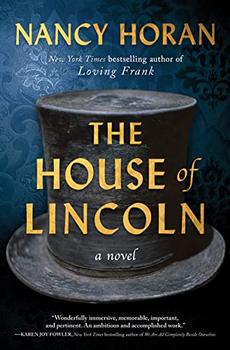Summary | Reading Guide | Discuss | Reviews | More Information | More Books

A Novel
by Nancy Horan
An unprecedented view of Lincoln's Springfield from the acclaimed and bestselling author of Loving Frank.
Nancy Horan, author of the million-copy New York Times bestseller Loving Frank, returns with a sweeping historical novel, which tells the story of Abraham Lincoln's ascendance from rumpled lawyer to U.S. president to the Great Emancipator through the eyes of a young asylum-seeker who arrives in Lincoln's home of Springfield from Madeira, Portugal.
Showing intelligence beyond society's expectations, fourteen-year-old Ana Ferreira lands a job in the Lincoln household assisting Mary Lincoln with their boys and with the hostess duties borne by the wife of a rising political star. Ana bears witness to the evolution of Lincoln's views on equality and the Union and observes in full complexity the psyche and pain of his bold, polarizing wife, Mary.
Along with her African American friend Cal, Ana encounters the presence of the underground railroad in town and experiences personally how slavery is tearing apart her adopted country. Culminating in an eyewitness account of the little-known Springfield race riot of 1908, The House of Lincoln takes readers on a journey through the historic changes that reshaped America and that continue to reverberate today.
You can see the full discussion here. This discussion will contain spoilers!
Some of the recent comments posted about The House of Lincoln:
"If A can prove…that he may of right enslave B, why may not B snatch the same argument and prove equally that he may enslave A?" Why do you think Lincoln's logic failed to sway more of the population?
I think it has to do with power and money. The white males, who were the majority at the time, had the power, money, land, status, education; they were the government, the ones making the laws. It came down to greed and fear of losing what one ... - LS
"That was what you did in America. You started at low wages toiling for somebody else, but with hard work, in a year or two, you could have employees working for you." How possible was this then? What about now?
For freed slaves and immigrants,it was not easy to move up to better jobs. It depended on their skills, their drive to make a better life, who they knew and what prejudices they encountered. It is still true today that it is not easy for everyone to ... - sylviala
"The future depended on marriage. Marriage meant you had a plan." What do you think of this statement? Do you agree it was true at the time? How much has this changed in today’s United States?
One can plan, and I think in the 1880s marriage itself was much more of a given than it is today. After marriage, however, plans could easily change then as they can now, and not necessarily by choice. War interferes, as it did for Ana. Life events ... - marianned
Ana thinks that Lincoln "was born in a time and place where race prejudice was learned early on" yet he overcame his biases. How do you think we can identify our own prejudices, and how do we become more tolerant?
Recognize that fear of the unknown and fear of those different than ourselves is just that - fear. To overcome fear we must educate ourselves and see every other human being as our fellow man. I came upon a quote recently that I can’t quite ... - LS
Ana worries that the race riot of 1908 will become a "condemned memory that will be unknown in fifty years" Do you believe shameful historical incidents do get permanently forgotten, or are they only suppressed temporarily?
Much of our history is not taught to students today. I did not know of the 1908 Springfield race riots. It is sad that many race riots have occurred throughout our history, but hopefully they will not be forgotten. Historical fiction such as this ... - sylviala
"The book's greatest strength is its unexpected examination of racism in central Illinois...[T]he shifts in focus between the two threads don't always work. But nonetheless, Horan has succeeded in illuminating an underconsidered segment of American history. By adding nuance to the history of Illinois in the years surrounding the Civil War, Horan foregrounds the era's complexity." —Kirkus Reviews
"Brimming with a rich and unforgettable array of imagined and real historical figures who helped to shape Springfield, Illinois and the nation beyond during the turbulent time of slavery and the Civil War, The House of Lincoln is storytelling at its best." ―Gail Tsukiyama, author of The Color of Air, The Samurai's Garden, and Women of the Silk
"Here, happily, is Nancy Horan doing once again what Nancy Horan does best – telling us the part of the story we don't yet know. Strong on fine detail yet cognizant of the expansive historical context, Horan's newest is wonderfully immersive, memorable, important, and pertinent. An ambitious and accomplished work." ―Karen Joy Fowler, New York Times bestselling author of We Are All Completely Beside Ourselves
"Nancy Horan's nuanced portrait of Abraham Lincoln as his thoughts on emancipation evolve and her deft, revelatory use of narrators from marginalized communities enhance this compelling, beautifully crafted novel. The House of Lincoln evokes the past to illuminate the present as only the very best historical fiction can." ―Jennifer Chiaverini, New York Times bestselling author of Mrs. Lincoln's Sisters
"What a gift Nancy Horan has for conjuring the past and bringing it vividly to life! Here, she turns her considerable talents to Lincoln's strange road to the White House and the turbulence of his presidency, illuminating lesser-known perspectives and details that resonate eerily with our contemporary times. This is top-quality literary time-travel, and the trip is well worth taking." ―Therese Fowler, New York Times bestselling author of A Well-Behaved
Woman
"The gifted Nancy Horan once again brings readers into a story -- inspired by real events -- that will forever change the way they perceive famous historical figures and their times. In the captivating and important The House of Lincoln, the young Portuguese immigrant Ana is hired to help in the Springfield, Illinois home of Abraham Lincoln as the Great Emancipator is on the rise. Through Ana's relationship with Lincoln's wife Mary and her close friendship with Cal, a free Black girl, the novel explores a lesser-known aspect of a crucial historical period." ―Marie Benedict, New York Times bestselling author of The Only Woman in the Room
This information about The House of Lincoln was first featured
in "The BookBrowse Review" - BookBrowse's membership magazine, and in our weekly "Publishing This Week" newsletter. Publication information is for the USA, and (unless stated otherwise) represents the first print edition. The reviews are necessarily limited to those that were available to us ahead of publication. If you are the publisher or author and feel that they do not properly reflect the range of media opinion now available, send us a message with the mainstream reviews that you would like to see added.
Any "Author Information" displayed below reflects the author's biography at the time this particular book was published.
Nancy Horan is the New York Times bestselling author of Loving Frank and Under the Wide and Starry Sky. Loving Frank remained on the NYT list for over a year, has been translated into sixteen languages and received the 2009 Prize for Historical Fiction. A native Midwesterner, Horan was a teacher and journalist before turning to fiction. She lived for 25 years in Oak Park, Illinois, where she raised her two sons, and she now lives with her husband on an island in Puget Sound.




If there is anything more dangerous to the life of the mind than having no independent commitment to ideas...
Click Here to find out who said this, as well as discovering other famous literary quotes!
Your guide toexceptional books
BookBrowse seeks out and recommends the best in contemporary fiction and nonfiction—books that not only engage and entertain but also deepen our understanding of ourselves and the world around us.